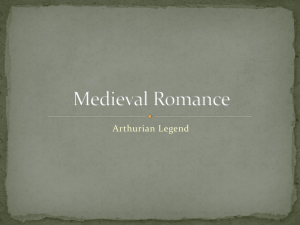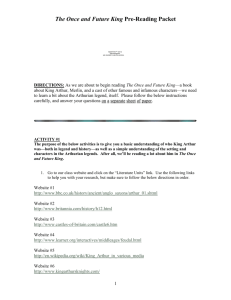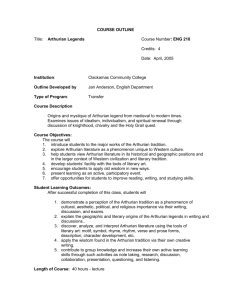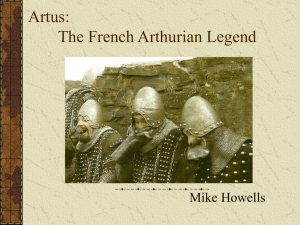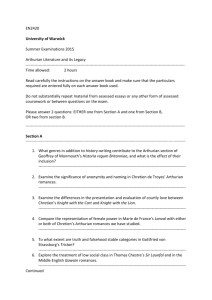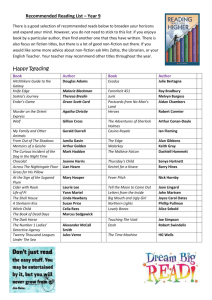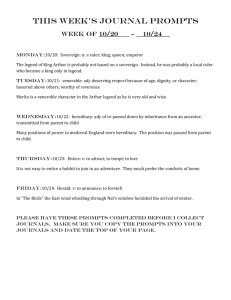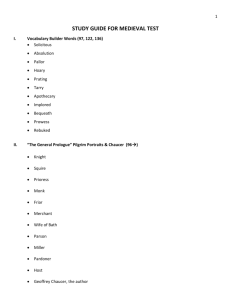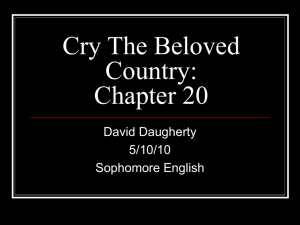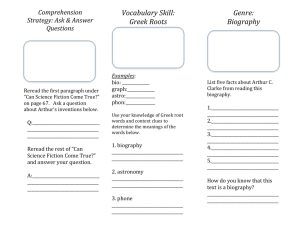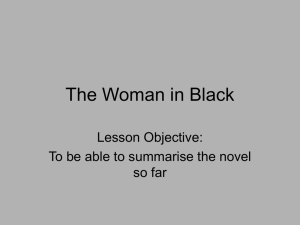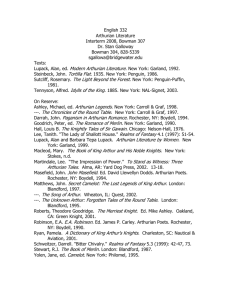The Romance of King Arthur - Duke University | German Department
advertisement
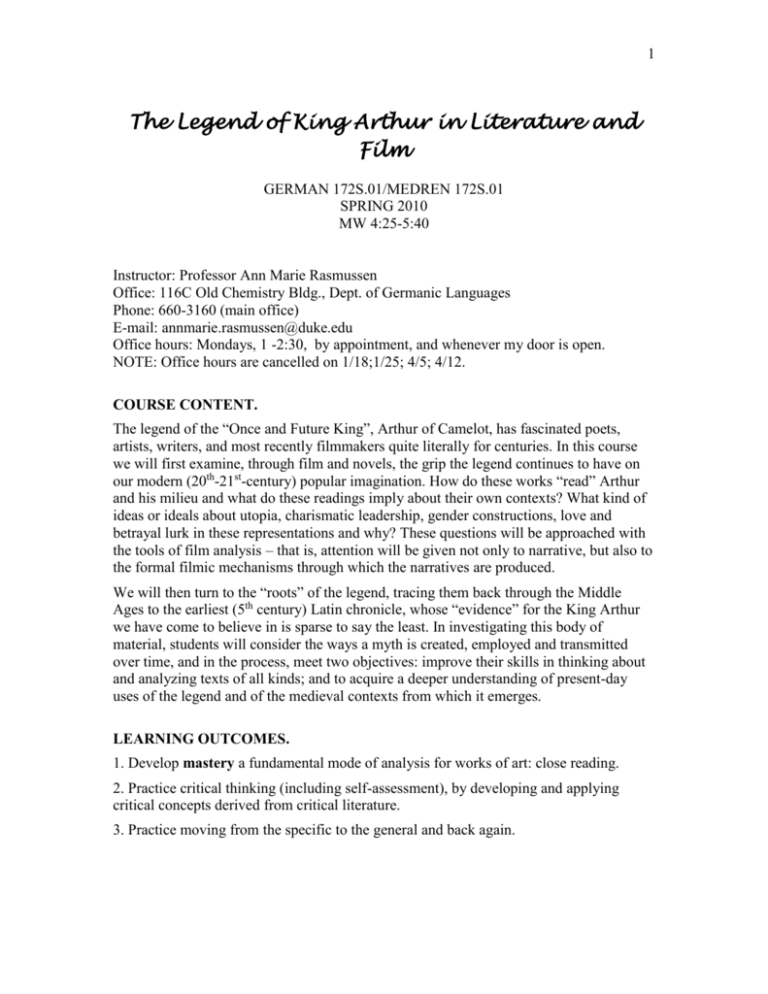
1 The Legend of King Arthur in Literature and Film GERMAN 172S.01/MEDREN 172S.01 SPRING 2010 MW 4:25-5:40 Instructor: Professor Ann Marie Rasmussen Office: 116C Old Chemistry Bldg., Dept. of Germanic Languages Phone: 660-3160 (main office) E-mail: annmarie.rasmussen@duke.edu Office hours: Mondays, 1 -2:30, by appointment, and whenever my door is open. NOTE: Office hours are cancelled on 1/18;1/25; 4/5; 4/12. COURSE CONTENT. The legend of the “Once and Future King”, Arthur of Camelot, has fascinated poets, artists, writers, and most recently filmmakers quite literally for centuries. In this course we will first examine, through film and novels, the grip the legend continues to have on our modern (20th-21st-century) popular imagination. How do these works “read” Arthur and his milieu and what do these readings imply about their own contexts? What kind of ideas or ideals about utopia, charismatic leadership, gender constructions, love and betrayal lurk in these representations and why? These questions will be approached with the tools of film analysis – that is, attention will be given not only to narrative, but also to the formal filmic mechanisms through which the narratives are produced. We will then turn to the “roots” of the legend, tracing them back through the Middle Ages to the earliest (5th century) Latin chronicle, whose “evidence” for the King Arthur we have come to believe in is sparse to say the least. In investigating this body of material, students will consider the ways a myth is created, employed and transmitted over time, and in the process, meet two objectives: improve their skills in thinking about and analyzing texts of all kinds; and to acquire a deeper understanding of present-day uses of the legend and of the medieval contexts from which it emerges. LEARNING OUTCOMES. 1. Develop mastery a fundamental mode of analysis for works of art: close reading. 2. Practice critical thinking (including self-assessment), by developing and applying critical concepts derived from critical literature. 3. Practice moving from the specific to the general and back again. 2 REQUIRED TEXTS. AVAILABLE AT REGULATOR BOOKSTORE. Parzival and Titurel by Wolfram von Eschenbach (Oxford’s World Classics). James J. Wilhelm, The Romance of Arthur, new expanded edition (Garland Publishing 1994) (=RA). Sir Gawain and the Green Knight, Pearl, Sir Orfeo. Trans. J. R. R. Tolkien (Ballantine). Alfred,ord Tennyson. Idylls of the King. Ed. by W. J. Rolfe (Dover). All other excerpts, articles, and poems can be accessed from the Electronic Reserves either directly from the Library home page or through our Course Page (Blackboard) (look under Course Documents). GRADING. PARTICIPATION: 25% This grade is based on BB and class expert contributions, which are graded on a simple scale of Pass/Low Pass/Fail (10/5/0). READING QUIZES: 15% 2 PAPERS (5 pages each): 30% MID-TERM: 10% FINAL PAPER (10 pp. long): 20% VIEWING ASSIGNMENTS. All the films indicated on the syllabus should be viewed independently, before the day indicated on the syllabus. The day on the syllabus is the day of the in-class discussion. A screening can be organized if there is interest. WRITTEN ASSIGNMENTS. The papers are all based on close reading (of either a film sequence or a brief passage from a text). For further clarification, see the document posted on the course blackboard website. Grading standards for papers have also been posted. The final paper should make use of close reading while expanding the scope of inquiry into a topic of the students’ choice. BLACKBOARD. The class has been divided into four BB discussion groups. New groups will be created during spring break. See guidelines in this syllabus. Each week, each Discussion Board group is moderated by a student who initiates and facilitates discussion. We will establish a roster on the first day of class. Grading standards for Discussion Board submissions and moderation have been posted. CLASS EXPERTS. Each week two or three students are in charge of posting openended study questions and facilitating class discussion. Study questions for Monday’s class must be posted no later than the preceeding Friday at 8:00 pm; study questions for Wednesday’s class must no later than the preceeding Monday at 8:00 pm. MIDTERM. This is an in-class writing, close looking exercise. READING QUIZES. Administered at the beginning of class. The slide with the quiz goes up 2 minutes before class starts. 3 Week One Jan 13 (NOTE: Jan 18 is MLK Day; no class). Introduction: “Film Glossary” and “Reading the Opening Sequence.” Jan 20 Discussion: Monty Python and the Holy Grail (1975). David Day, “Monty Python and the Medieval Other.” Week Two Jan 25 LIBRARY DAY. MEET in Bostock Library, Room 023 (on the lower level, down the ramp from The Link). Sara Seten Berghausen, Librarian for Literature and Theater Studies, will conduct class. Jan 27 NO CLASS. Week Three February 1 Discussion: Excalibur (1981) February 3 Umland, Ch. 1 (pp. 1-19): “The Arthurian Legend and Its Methods of Transmission”; Norris Lacy, “Mythopoeia in Excalibur.” Week Four February 8 Discussion: Lancelot du Lac (1974). February 10 Richard Bartone, “Variations…” February 12, 4:00 pm: PAPER 1 DUE – CLOSE LOOKING (5 pp.) Week Five February 15 Discussion: The Fisher King February 17 Umland, Ch. 6 (pp. 153-185): “Arthurian Legend as Postmodern Quest.” Week Six February 22 Discussion: King Arthur (2004). Read historical background from B. Rosenwein’s Short History of the Middle Ages. February 24 MIDTERM (IN-CLASS EXAM). 4 Week Seven March 1 Alfred, Lord Tennyson, Idylls of the King: “Merlin and Vivien” (pp. 113-137). March 3 Alfred Lord Tennyson, Idylls of the King: “The Passing of Arthur” (pp. 247-258). Week Eight SPRING BREAK March 5-14 Week Nine March 15 Caxton’s original preface to Malory. RA: Ch. XIX - Thomas Malory, Morte D’Arthur. March 17 RA: Ch. XIX - Thomas Malory, Morte D’Arthur. Week Ten March 22 Sir Gawain and the Green Knight (J. R. R. Tolkien’s translation). March 24 Sir Gawain and the Green Knight (J. R. R. Tolkien’s translation). Week Eleven March 29 RA: Ch. XVII – Wolfram von Eschenbach, Parzival (excerpts). March 31 Wolfram von Eschenbach, Parzival. Week Twelve April 5 Wolfram von Eschenbach, Parzival and Marie de France, Lanval. April 7 RA: Ch. VII - Chrétien de Troyes, Lancelot, or the Knight of the Cart. Week Thirteen April 12 RA: Chrétien de Troyes, Lancelot. April 14 RA: Ch. XIV – Prose Merlin. Week Fourteen April 19 RA: Ch. V – Wace, Roman de Brut (Merlin Episodes). RA: Ch. IV – Geoffrey of Monmouth, History of the Kings of Britain. April 21 5 RA: Geoffrey of Monmouth (continued). Week Fifteen April 26 RA: Ch. II – The Welsh Tradition RA: Ch. I – The Latin chronicles April 28 Bonnie Wheeler, “The Masculinity of King Arthur”. POINTERS AND POLICIES 1. Classroom Etiquette. Be on time. Bring to class the book we are currently reading. If you feel drowsy, leave the class and get a drink of water. Turn off your cell phone before you come to class. If you wish to eat during class, please bring enough food to share with everyone. 2. Absences. University policy regarding absence due to illness or emergency applies. 3. E-mail. 1. E-mail is not suited for urgent messages or special requests. If you have a problem you need to discuss, I expect to talk with you, either face-to-face or on the phone. 2. The following items are accepted via e-mail in the main body of the message: a. short questions regarding the content of papers or exams (but note number 1 above.) b. making appointments more than 48 hours ahead of time. If you are using a web-based e-mail program, turn off the graphics feature 3. NO papers are accepted via e-mail, either as messages or as attachments or via Blackboard. These assignments must be turned in on paper. 4. Turning in Papers Due dates for papers are on this syllabus. No attachments, no e-copies, no faxes. Expectations regarding the papers will be clearly spelled out for you before the paper is due. 5. Late Assignments Late assignments will lose one grade step for each day they are late. If a B+ paper is turned in late on the due date it becomes a B paper; if it is turned in the following day it is a B- paper, and so on. Excuses arising out of technical complications of any kind (printer errors, computer crashes, overcrowding at printers, etc.) will not be considered; lastminute technological complications are not acts of God but rather symptoms of poor time management. 6. Academic Honesty at Duke 1. Collaboration is encouraged and allowed in studying and doing homework assignments 2. Citation methods to be used in this course are the style being used in your writing course. 6 3. Texts and exams used in previous years may be reviewed in preparation for this course. 4. Papers developed for this course should not be submitted to another course (but do please see the professors for help if you wish to use parts of a paper for another course). Help on documentation guidelines and methods for citing sources can be found at www.lib.duke.edu/libguide/citing.htm. "Plagiarism: Its nature and consequences": www.lib.duke.edu/plagiarism.htm The Writing Studio at CTLW: www.ctlw.duke.edu/wstudio/index.html 7. The Duke Community Standard. The new version of the Duke Community Standard, effective fall 2007: Duke University is a community dedicated to scholarship, leadership, and service and to the principles of honesty, fairness, respect, and accountability. Citizens of this community commit to reflect upon and uphold these principles in all academic and non-academic endeavors, and to protect and promote a culture of integrity. To uphold the Duke Community Standard: * I will not lie, cheat, or steal in my academic endeavors; * I will conduct myself honorably in all my endeavors; and * I will act if the Standard is compromised. ON RESERVE: Films – ON RESERVE at LILLY Library: Monty Python and the Holy Grail John Boorman, Excalibur Robert Bresson, Lancelot du Lac/Lancelot of the Lake Debra Hill, Fischer King Antoine Fuqua, King Arthur Books: Harty, Kevin J., ed. Cinema Arthurian, Essays on Arthurian Film. Mancoff, Debra, ed. King Arthur’s Modern Return. Sklar, Elizabeth and Donals Hoffman, eds. King Arthur in Popular Culture. Stewart, R. J., and John Matthews, eds. Merlin Through the Ages. Umland, Rebecca and Samuel Umland. The Use of Arthurian Legend in Hollywood Film. SOME ADDITIONAL RESOURCES: 7 In Reference: Lacy, Norris and Geoffrey Ashe. The Arthurian Handbook. 2nd ed. (1997). Lacy, Norris, et al. The New Arthurian Encyclopedia. Rev. ed. (1996). In Stacks: Alcock, Leslie. Arthur’s Britain: History and Archeology. Arnold, Benjamin. German Knighthood, 1050-1300. Ashe, Geoffrey. The Quest for Arthur’s Britain. Brault, Gerard. Early Blazon: Heraldic Terminology in the Twelfth and Thirteenth Centuries. Bumke, Joachim. Courtly Culture: Literature and Society in the High Middle Ages. Capellanus, Andreas. The Art of Courtly Love. Collins, Roger. Early Medieval Europe 300-1000. Duby, Georges. The Knight, the Lady and the Priest. Jaeger, Stephen. The Origins of Courtliness. Knight, Stephen. Arthurian Literature and Society. Lacy, N. and Geoffrey Ashe. The Arthurian Handbook. Lagorio, Valerie. King Arthur Through the Ages. Loomis, Roger Sherman. Celtic Myth and Arthurian Romance. Loomis, Roger Sherman. The Development of Arthurian Romance. Olton, Bert. Arthurian Legends on Film and Television. Reiss, E. and L. Reiss. Arthurian Legend and Literature: An Annotated Bibliography. Reno, Frank D. The Historic King Arthur. Schultz, James. The Shape of the Round Table: Structures of Middle High German Arthurian Romance. Slocum, Sally K. Popular Arthurian Tradition. Vale, Juliet. Edward III and Chivalry: Chivalric Society and Its Context. Weston, Jessie. From Ritual to Romance.
